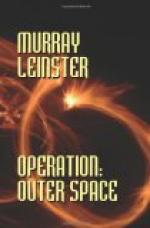“Is it?” asked Babs. “On the broadcast Mr. Jamison said that there was as much land here as on all the continent of Asia. Maybe he exaggerated. Say there’s only as much land not ice-covered as there is in South America. It’s all forest and plain and—uninhabited.” She moistened her lips, but her voice was very steady. “If all of South America was uninhabited, and there were two people lost in it, and nobody knew where they were—how long would it take to find them?”
“It would be a matter of luck,” admitted Cochrane.
“If the ship comes back, it can’t hover to look for us. There isn’t fuel enough. It couldn’t spot us from space if it went in an orbit like a space platform. By the time they could get help—they wouldn’t even be sure we were alive. If we can’t count on being found right away, this burned-over place will be green again. In two or three weeks they couldn’t find it anyhow.”
Cochrane fidgeted. He had worked out all this for himself. He’d been disturbed at having to tell it, or even admit it to Babs. Now she said in a constrained voice:
“If men came to this planet and built a city and hunted for us, it might still be a hundred years before anybody happened to come into this valley. Looking for us would be worse than looking for a needle in a haystack. I don’t think we’re going to be found again.”
Cochrane was silent. He felt guiltily relieved that he did not have to break this news to Babs. Most men have an instinctive feeling that a woman will blame them for bad news they hear.
A long time later, Babs said as quietly as before:
“Johnny Simms asked me to come along while he went hunting. I didn’t. At least I—I’m not cast away with him!”
Cochrane said gruffly:
“Don’t sit there and brood! Try to get some sleep.”
She nodded. After a long while, her head drooped. She jerked awake again. Cochrane ordered her vexedly to make herself comfortable. She stretched out beside the wall of wood that Cochrane had made. She said quietly:
“While we’re looking for food tomorrow morning, we’d better keep our eyes open for a place to build a house.”
She closed her eyes.
Cochrane kept watch through the dark hours. He heard night-cries in the forest, and once toward dawn the distant volcano seemed to undergo a fresh paroxysm of activity. Boomings and explosions rumbled in the night. There were flickerings in the sky. But there were fewer temblors after it, and no shocks at all.
More than once, Cochrane found himself dozing. It was difficult to stay in a state of alarm. There was but one single outcry in the forest that sounded like the shriek of a creature seized by a carnivore. That was not nearby. He tried to make plans. He felt bitterly self-reproachful that he knew so few of the things that would be useful to a castaway. But he had been a city man all his life. Woodcraft was not only out of his experience—on overcrowded Earth it would have been completely useless.




